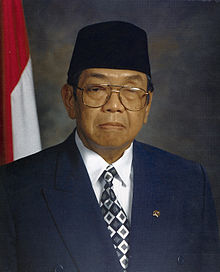Abdurrahman Wahid | |
|---|---|
 Official portrait, 1999 | |
| 4th President of Indonesia | |
| In office 20 October 1999 – 23 July 2001 | |
| Vice President | Megawati Sukarnoputri |
| Preceded by | B. J. Habibie |
| Succeeded by | Megawati Sukarnoputri |
| Chairman of Nahdlatul Ulama | |
| In office 1984–1999 | |
| Preceded by | Idham Chalid |
| Succeeded by | Hasyim Muzadi |
| Personal details | |
| Born | Abdurrahman ad-Dakhil 7 September 1940 Djombang, Dutch East Indies |
| Died | 30 December 2009 (aged 69) Jakarta, Indonesia |
| Resting place | Jombang, East Java |
| Political party | PKB |
| Height | 163 cm (5 ft 4 in)[1] |
| Spouse | |
| Children | 4, including Yenny Wahid |
| Parents |
|
| Relatives |
|
| Alma mater | |
| Occupation |
|
| Signature |  |
| Website | gusdur |
| Nickname | Gus Dur |
Abdurrahman Wahid (/ˌɑːbdʊəˈrɑːxmɑːn wɑːˈhiːd/ AHB-doo-RAHKH-mahn wah-HEED; né ad-Dakhil,[2][3] 7 September 1940 – 30 December 2009), more colloquially known as Gus Dur (), was an Indonesian politician and Islamic religious leader who served as the fourth president of Indonesia, from his election in 1999 until he was removed from office in 2001. A long time leader within the Nahdlatul Ulama organization, he was the founder of the National Awakening Party (PKB). He was the son of Minister of Religious Affairs Wahid Hasyim, and the grandson of Nahdatul Ulama founder Hasyim Asy'ari. Due to a visual impairment caused by glaucoma, he was blind in the left eye and partially blind in his right eye. He was the first (and to date only) president of Indonesia to have had physical disabilities. The name Abdurrahman Wahid means "Servant of Mercy the First."
Wahid was instrumental in lifting the ban on Chinese New Year (Indonesian: Imlek). Until 1998, the spiritual practice to celebrate the Chinese New Year by Chinese families was restricted specifically only inside of Chinese community centers. This restriction is made by the New Order government through Presidential Instruction No. 14 of 1967 signed by Suharto. On 17 January 2000, Wahid issued Presidential Decree No. 6 of 2000 to annul the previous instruction.[4] He established Confucianism as the sixth official religion in Indonesia in 2000 and protected minority rights in Indonesia. As a result, Wahid was given the title "Father of Pluralism."[5]
His popular nickname 'Gus Dur' is derived from Gus, a common honorific for a son of kyai, and from the short-form of bagus ('handsome lad' in Javanese[6]); and Dur, short-form of his name, Abdurrahman.
- ^ Romi, J (24 November 2020) [11 May 2020]. Hendra (ed.). "Penasaran Tidak, Berapa Sih Tinggi Badan Semua Presiden Indonesia" [Are You Curious, How Tall Are All the Presidents of Indonesia]. BertuahPos (in Indonesian). Archived from the original on 12 August 2020. Retrieved 6 February 2024.
- ^ "Dari Abdurrahman Addakhil Menjadi Gus Dur" (in Indonesian). Surya Online. 31 December 2009. Archived from the original on 1 January 2010. Retrieved 31 December 2009.
- ^ Handayani, Primastuti (31 December 2009). "Obituary: Why fuss?!". The Jakarta Post. Archived from the original on 12 April 2010. Retrieved 31 December 2009.
- ^ "Keputusan Presiden Republik Indonesia Nomor 6 Tahun 2000 - Wikisource bahasa Indonesia".
- ^ "Daftar Julukan 6 Presiden RI, Apa Julukan Jokowi? Halaman all". 18 April 2022.
- ^ Geertz, Clifford; Fred Inglis (2010). Life Among the Anthros and Other Essays. Princeton University Press. p. 115. ISBN 978-0-691-14358-3.